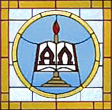 |

|
 |
Study 2: The Spirit of God Definition | Inspiration | Gifts of the Holy Spirit | The Withdrawal of the Gifts | The Bible The Only Authority | Digressions (Is the Holy Spirit A Person?, The Principle of Personification, Calvinism, "Ye shall receive the . . . Holy Spirit", "These signs shall follow") | Questions |
Digression 5: The Principle Of PersonificationSome may find it difficult to accept the explanation of the personification of the devil, because the devil is so often referred to in the Bible as if it were a person and perhaps this confuses some people. This is easily explained by pointing out that it is a recognized feature of the Bible that inanimate or non-living things such as wisdom, riches, sin, the church are personified, but only in the case of the devil is some fantastic theory woven around it. The following examples will illustrate the point:- WISDOM IS PERSONIFIED
These verses, and indeed the rest of the chapters in which they appear, show that wisdom is personified as a woman, but because of this, no-one has the idea that wisdom is a literal beautiful woman who roams around the earth; all recognize that it is a very desirable characteristic which all people should try to acquire. RICHES ARE PERSONIFIED
Here, riches are likened to a master. Many people strive very hard to gain riches and in this way they become their master. Jesus is here telling us that we cannot do that and serve God acceptably at the same time. The teaching is simple and effective, but no-one assumes from this that riches is a man named Mammon. SIN IS PERSONIFIED
As in the case of riches, sin is likened here to a master and those who commit sin are its servants. No reasonable reading of the passage justifies assuming that Paul is teaching that sin is a person. THE SPIRIT IS PERSONIFIED
Jesus is here telling His disciples that they would receive the power of the Holy Spirit, and this was fulfilled on the day of Pentecost, as recorded in Acts 2:3-4, where it is stated that "there appeared unto them cloven tongues like as of fire, and it sat upon each of them. And they were all filled with the Holy Spirit", which gave them remarkable power to do wonderful things to prove that their authority was from God. The Holy Spirit was not a person, it was a power, but when Jesus was speaking of it He used the personal pronoun "he". DEATH IS PERSONIFIED
THE NATION OF ISRAEL IS PERSONIFIED
The context of these passages reveals clearly that the prophet is not referring to a literal virgin or to Ephraim as a person, but to the nation of Israel, which in this instance is personified, in a similar manner as Great Britain is sometimes personified as 'Britannia' or 'John Bull'. There are no such persons as this woman and man, but when they are referred to in books or portrayed in pictures everyone knows that Great Britain is meant. THE BELIEVERS IN CHRIST ARE PERSONIFIED
All these verses obviously refer to the community of people who were the true believers in Christ, sometimes referred to as "the church", though this must not be confused with any of the present orthodox churches, which have long since ceased to be the true believers in Christ. The true believers, that is, those who hold and believe the true doctrines taught in the Bible, are referred to as a "chaste virgin", indicating the purity of the lives they should lead, and as a "body", a suitable figure because just as a natural body has many functions, so the true church has many responsibilities and performs various functions. When the church is referred to as a "body", no-one mistakes it for an individual, nor would they mistake the devil or satan for a grotesque monster or fallen angel had the words been properly translated, or if men and women had not acquired wrong ideas derived from the false churches in days gone by. Adapted from "Christendom Astray" by Robert Roberts. |